小学五年级英语重点句型必备
- 格式:docx
- 大小:14.71 KB
- 文档页数:1
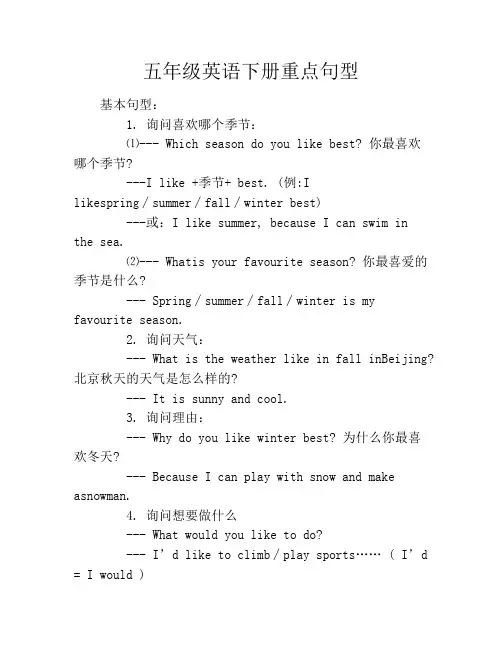
五年级英语下册重点句型基本句型:1. 询问喜欢哪个季节:⑴--- Which season do you like best? 你最喜欢哪个季节?---I like +季节+ best. (例:Ilikespring∕summer∕fall∕winter best)---或:I like summer, because I can swim inthe sea.⑵--- Whatis your favourite season? 你最喜爱的季节是什么?--- Spring∕summer∕fall∕winter is myfavourite season.2. 询问天气:--- What is the weather like in fall inBeijing? 北京秋天的天气是怎么样的?--- It is sunny and cool.3. 询问理由:--- Why do you like winter best? 为什么你最喜欢冬天?--- Because I can play with snow and make asnowman.4. 询问想要做什么--- What would you like to do?--- I’d like to climb∕play sports…… ( I’d = I would )5. 询问具体季节--- What season is it in March in Beijing? 北京的三月份是什么季节?--- It is spring.6. 询问能做什么--- What can I do there? 我在那里能做什么?--- You can go to the Great Wall. 你可以去长城。
7. 询问接下来打算去哪里?( be going to一般将来时)--- Where are you going on vacation? 假期你打算去哪里?--- I am going toCanada. 我将要去加拿大。
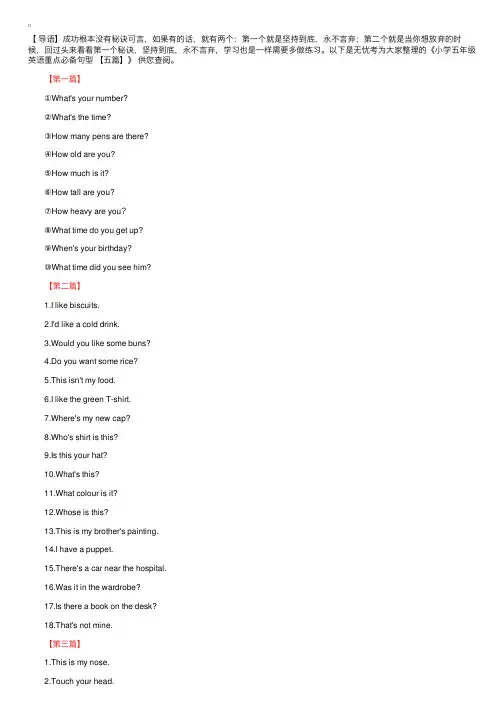
【导语】成功根本没有秘诀可⾔,如果有的话,就有两个:第⼀个就是坚持到底,永不⾔弃;第⼆个就是当你想放弃的时候,回过头来看看第⼀个秘诀,坚持到底,永不⾔弃,学习也是⼀样需要多做练习。
以下是⽆忧考为⼤家整理的《⼩学五年级英语重点必备句型【五篇】》供您查阅。
【第⼀篇】①What's your number? ②What's the time? ③How many pens are there? ④How old are you? ⑤How much is it? ⑥How tall are you? ⑦How heavy are you? ⑧What time do you get up? ⑨When's your birthday? ⑩What time did you see him?【第⼆篇】1.I like biscuits. 2.I'd like a cold drink. 3.Would you like some buns? 4.Do you want some rice? 5.This isn't my food. 6.I like the green T-shirt. 7.Where's my new cap? 8.Who's shirt is this? 9.Is this your hat? 10.What's this? 11.What colour is it? 12.Whose is this? 13.This is my brother's painting. 14.I have a puppet. 15.There's a car near the hospital. 16.Was it in the wardrobe? 17.Is there a book on the desk? 18.That's not mine.【第三篇】1.This is my nose. 2.Touch your head. 3.Raise your arm. 4.I'm twelve years old. 5.My hobby is reading. 6.I like music. 7.I'm interested in space. 8.My name is Peter. 9.I'm tall and thin. 10.Do you have any hobbies? 11.Who's he? He's my father. 12.He's a doctor 13.He likes playing games. 14.My father helps me. 15.Is he a soldier? 16.What's he?【第四篇】1.My singing is louder than yours. 2.I'm taller than you. 3.There more shops in Picture One. 4.Some stories are more interesting than others. 5.The most interesting stories. 6.Who is fatter? 7.Where were you? 8.Who was first? 9.Was it in the wardrobe? 10.Benny took my ball. 11.Where did you go? 12.What did you do? 13.I came by plane. 14.Anne wanted to skate.【第五篇】1.I'm/You're /He's/She's /We're/They're (not) going to swim. 2.Are you going to swim? 3.Is he/she going to visit Anne? 4.What are you going to do? 5.What is he going to do? 6.When are they going to swim? 7.Tomorrow will be rainy. 8.I'll stay at home. 9.I come to school by bus. 10.Your homework is good. 11.What time do you get up? 12.She always get up early.。
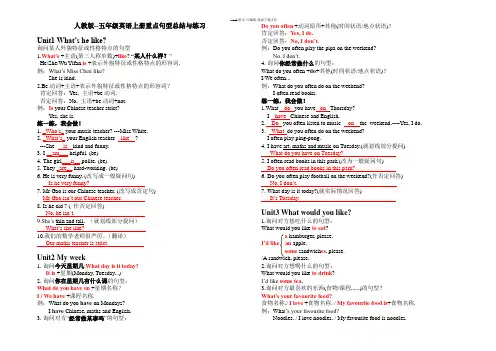
word格式-可编辑-感谢下载支持人教版--五年级英语上册重点句型总结与练习Unit1 What’s he like?询问某人外貌特征或性格特点的句型1.What’s +主语(第三人称单数)+like? “某人什么样?”He/She/Wu Yifan is +表示外貌特征或性格特点的形容词.例:What’s Miss Chen like?She is kind.2.Be动词+主语+表示外貌特征或性格特点的形容词?肯定回答:Yes, 主语+be动词.否定回答:No, 主语+be动词+not.例:Is your Chinese teacher strict?Yes, she is.练一练,我会做!1. _Who’s_ your music teacher? ---Miss White.2. _What’s_ your English teacher like ?---She is kind and funny.3.I __am___ helpful. (be)4.The girl___is__ polite. (be)5.They _are__ hard-working. (be)6. He is very funny. (改写成一般疑问句)Is he very funny?7. Mr Gao is our Chinese teacher. (改写成否定句)Mr Gao isn’t our Chinese teacher.8. Is he old ? ( 作否定回答)No, he isn’t.9.She’s thin and tall. (就划线部分提问)What’s she like?10.我们的数学老师很严厉。
(翻译)Our maths teacher is strict.Unit2 My week1.询问今天星期几:What day is it today?It is +星期(Monday, Tuesday...)2.询问你在星期几有什么课的句型:What do you have on +星期名称?I / We have +课程名称.例:What do you have on Mondays?I have Chinese, maths and English.3.询问对方“经常做某事吗”的句型:Do you often +动词原形+其他(时间状语/地点状语)?肯定回答:Yes, I do.否定回答:No, I don’t.例:Do you often play the pipa on the weekend?No, I don’t.4.询问你经常做什么的句型:What do you often +do+其他(时间状语/地点状语)?I/We often...例:What do you often do on the weekend?I often read books.练一练,我会做!1.What do you have on Thursday?I have Chinese and English.2. Do you often listen to music on the weekend.----Yes, I do.3. What do you often do on the weekend?I often play ping-pong.4.I have art, maths and music on Tuesday.(就划线部分提问)What do you have on Tuesday?5.I often read books in this park.(改为一般疑问句)Do you often read books in this park?6.Do you often play football on the weekend?(作否定回答)No, I don’t.7.What day is it today?(就实际情况回答)It’s Tuesday.Unit3 What would you like?1.询问对方想吃什么的句型:What would you like to eat?a hamburger, please.I’d like an apple.some sandwich es, please./A sandwich, please.2.询问对方想喝什么的句型:What would you like to drink?I’d like some tea.3.询问对方最喜欢的东西(食物/课程......)的句型?What’s your favourite food?食物名称./ I love +食物名称. / My favourite food is+食物名称. 例:Wha t’s your favourite food?Noodles. / I love noodles. / My favourite food is noodles.word格式-可编辑-感谢下载支持4.描述食物的味道的句型:主语+be动词+表示食物味道的形容词.例:It is sweet.The vegetables are healthy.They’re delicious.练一练,我会做!1.What would you like to eat ?I’d like a sandwich, please.2.What would you like to drink ?I’d like some water, please.3. It is hot.(be)4. The vegetables are delicious.(be)5. They are fresh.(be)6. I’d like some hamburgers .(hamburger)7. What is your favourite food?----Salad.Unit4 What can you do?1.询问对方会做什么的句型What can you do?I / We can +动词原形.例:What can you do for the party?I can play the piano.2. 询问对方“会做某事吗”的句型Can you + 动词原形+其他(时间状语/地点状语)?肯定回答:Yes, I/we can.否定回答:No, I/we can’t.例:Can you cook at home?Yes, I can.练一练,我会做!1.What can you do? I can swim .(swim)2.Can you cook ? No, I can’t .3.Can you cook ? Yes, I can.4.Can you wash your clothes at home?( 做否定回答)No, I can’t.5.I can sing English songs. (改为否定句)I can’t sing English songs.6.I can do some kung fu.(改为一般疑问句)Can you do any kung fu?7.I can play the erhu for the party.(就划线部分提问)What can you do for the party? Unit5 There is a big bed. Unit6 In a nature park1.询问某地有什么:What's in the room/park?回答“某处有某人”:There+be动词+某人/某物(+地点).(1)单数句:There+is +a/an+可数名词单数(+地点).例:There is a big bed in my room.改为否定句:There isn’t a big bed in my room.(2)复数句:There+are +(some/many/lots of...)可数名词复数(+地点).例:There are some tree s in the forest.改为否定句:There aren’t any trees in the forest.2.询问“某处有什么吗”的句型Be动词+there+某人/某物(+地点)?肯定回答:Yes, there+ be.否定回答:No, there+ be+not.单数句:Is there a/an +可数名词单数(+地点)?肯定回答:Yes, there is.否定回答:No, there isn’t.例:Is there an apple on the plate?No, there isn’t.复数句:Are there any +可数名词复数(+地点)?肯定回答:Yes,there are.否定回答:No, there aren’t.例:Are there any lakes in the nature park?Yes, there are.3. 询问物品在哪里: Where is+ 某种物品?It is+表示方位的介词+其他.例: Where is the ball?It is beside the dog.练一练,我会做!1.There is a tree beside the house.(be)2.There is an apple and an egg on the plate.(a/an)3.There are some hills in front of the house.(be)4.Are there any villages in the nature park?(some)----Yes, there are .5.Are there any buildings in the nature park?(building) ----No, there aren’t .6.What’s in the room? There is a big bed.7.Where is the desk? It’s in front of the chair.8.Is there a white mouse in the room?(作否定回答)No, there isn’t.9.There is a football behind the door.(改成否定句)There isn’t a football behind the door.word格式-可编辑-感谢下载支持10.The clock is beside the picture. (就划线部分提问)Where is the clock?11.There are many bottles on the desk.(改成单数句)There is a bottle on the desk.12.There are lots of plants in the garden.(改成一般疑问句)Are there lots of plants in the garden?13.There are some bikes in the house.(改成否定句)There aren’t any bikes in the house?14. There is a big photo above the computer.(就划线部分提问)What’s above thecomputer?。
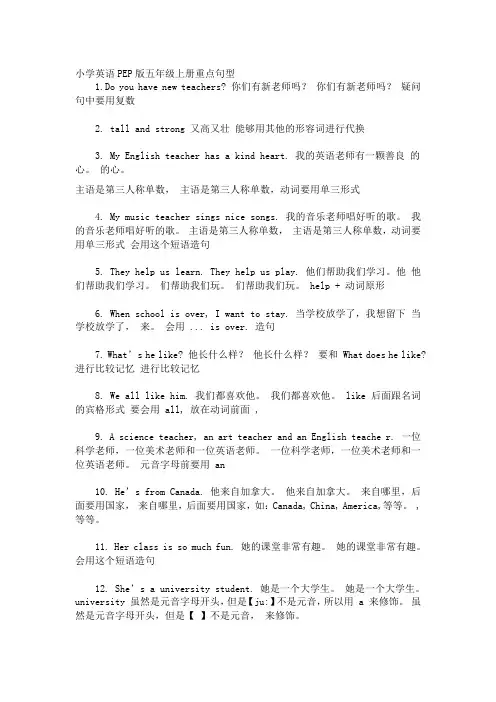
小学英语PEP版五年级上册重点句型1.Do you have new teachers? 你们有新老师吗?你们有新老师吗?疑问句中要用复数2. tall and strong 又高又壮能够用其他的形容词进行代换3. My English teacher has a kind heart. 我的英语老师有一颗善良的心。
的心。
主语是第三人称单数,主语是第三人称单数,动词要用单三形式4. My music teacher sings nice songs. 我的音乐老师唱好听的歌。
我的音乐老师唱好听的歌。
主语是第三人称单数,主语是第三人称单数,动词要用单三形式会用这个短语造句5. They help us learn. They help us play. 他们帮助我们学习。
他他们帮助我们学习。
们帮助我们玩。
们帮助我们玩。
help + 动词原形6. When school is over, I want to stay. 当学校放学了,我想留下当学校放学了,来。
会用 ... is over. 造句7. What’s he l ike? 他长什么样?他长什么样?要和 What does he like?进行比较记忆进行比较记忆8. We all like him. 我们都喜欢他。
我们都喜欢他。
like 后面跟名词的宾格形式要会用 all, 放在动词前面 ,9. A science teacher, an art teacher and an English teache r. 一位科学老师,一位美术老师和一位英语老师。
一位科学老师,一位美术老师和一位英语老师。
元音字母前要用 an10. He’s from Canada. 他来自加拿大。
他来自加拿大。
来自哪里,后面要用国家,来自哪里,后面要用国家,如:Canada, China, America,等等。
,等等。
11. Her class is so much fun. 她的课堂非常有趣。
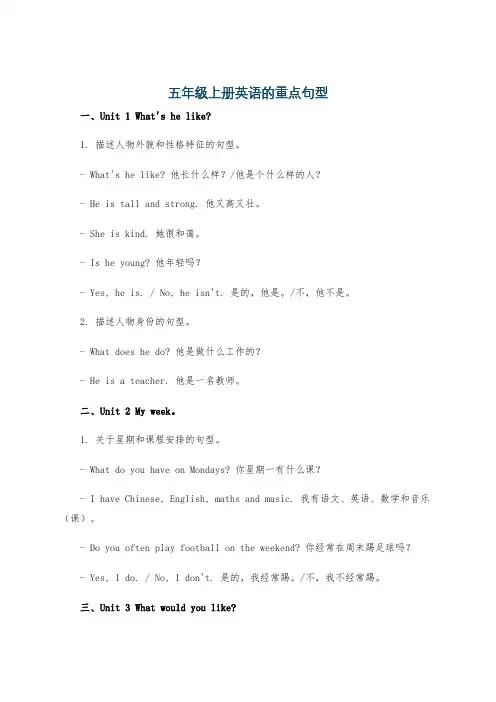
五年级上册英语的重点句型一、Unit 1 What's he like?1. 描述人物外貌和性格特征的句型。
- What's he like? 他长什么样?/他是个什么样的人?- He is tall and strong. 他又高又壮。
- She is kind. 她很和蔼。
- Is he young? 他年轻吗?- Yes, he is. / No, he isn't. 是的,他是。
/不,他不是。
2. 描述人物身份的句型。
- What does he do? 他是做什么工作的?- He is a teacher. 他是一名教师。
二、Unit 2 My week。
1. 关于星期和课程安排的句型。
- What do you have on Mondays? 你星期一有什么课?- I have Chinese, English, maths and music. 我有语文、英语、数学和音乐(课)。
- Do you often play football on the weekend? 你经常在周末踢足球吗?- Yes, I do. / No, I don't. 是的,我经常踢。
/不,我不经常踢。
三、Unit 3 What would you like?1. 询问和表达食物喜好的句型。
- What would you like to eat? 你想要吃什么?- I'd like some sandwiches. 我想要一些三明治。
- What would you like to drink? 你想要喝什么?- I'd like some water. 我想要一些水。
- What's your favourite food? 你最喜欢的食物是什么?- My favourite food is fish. 我最喜欢的食物是鱼。
四、Unit 4 What can you do?1. 询问和表达能力的句型。
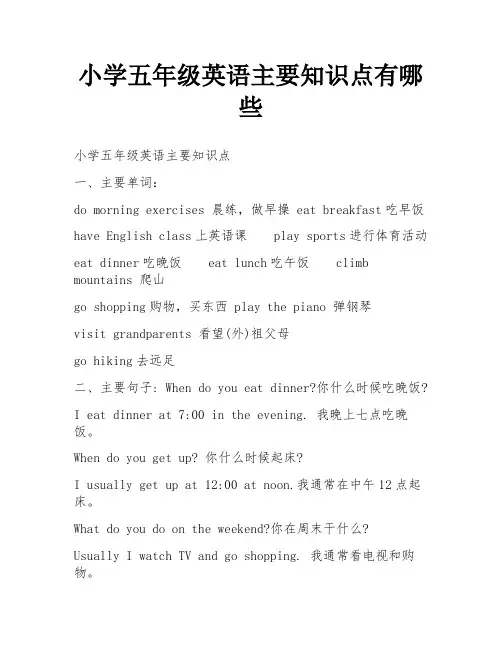
小学五年级英语主要知识点有哪些小学五年级英语主要知识点一、主要单词:do morning exercises 晨练,做早操 eat breakfast吃早饭have English class上英语课play sports进行体育活动eat dinner吃晚饭eat lunch吃午饭climb mountains 爬山go shopping购物,买东西 play the piano 弹钢琴visit grandparents 看望(外)祖父母go hiking去远足二、主要句子: When do you eat dinner?你什么时候吃晚饭?I eat dinner at 7:00 in the evening. 我晚上七点吃晚饭。
When do you get up? 你什么时候起床?I usually get up at 12:00 at noon.我通常在中午12点起床。
What do you do on the weekend?你在周末干什么?Usually I watch TV and go shopping. 我通常看电视和购物。
Sometimes I visit my grandparents.有时候我去看望我的外祖父母。
I often play football. 我经常踢足球。
Sometimes I go hiking.有时候我去远足。
三、同义词eat breakfast—have breakfast eat lunch—have lunch eat dinner—have dinner play sports—do sportsusually—often复数形式:policeman—policemen policewoman—policewomen现在分词:tell—telling三单:say—says同义句:What do you do ? ---What are you? 你是干什么的?四、表示频度的副词:always 总是,一直usually 通常,常常often 经常sometimes 有时候五、以复数形式出现的词组:visit grandparents plant trees六、介词后跟表示时间的词语时,表示在某年、某月、某个季节,某个时候(在上午,在下午,在晚上)用in;表示在某一天,在星期几用on,在具体的几点几分用at.七、too 和either的用法区别:too和either都是“也”的意思,但too用于肯定句,either用于否定句。
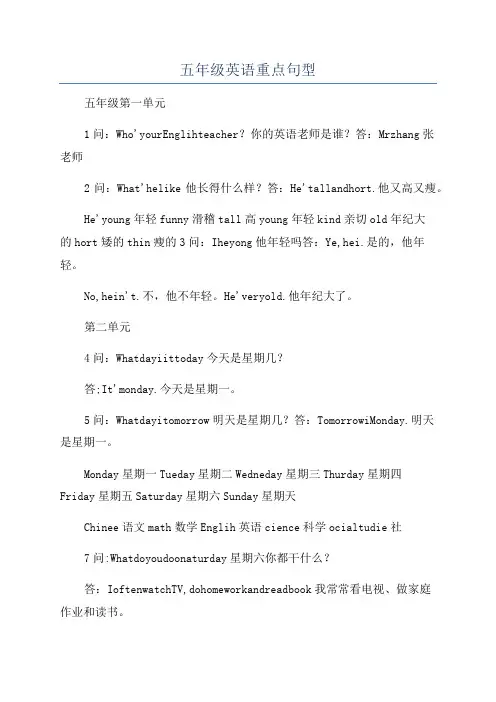
五年级英语重点句型五年级第一单元1问:Who'yourEnglihteacher?你的英语老师是谁?答:Mrzhang张老师2问:What'helike他长得什么样?答:He'tallandhort.他又高又痩。
He'young年轻funny滑稽tall高young年轻kind亲切old年纪大的hort矮的thin瘦的3问:Iheyong他年轻吗答:Ye,hei.是的,他年轻。
No,hein't.不,他不年轻。
He'veryold.他年纪大了。
第二单元4问:Whatdayiittoday今天是星期几?答;It'monday.今天是星期一。
5问:Whatdayitomorrow明天是星期几?答:TomorrowiMonday.明天是星期一。
Monday星期一Tueday星期二Wedneday星期三Thurday星期四Friday星期五Saturday星期六Sunday星期天Chinee语文math数学Englih英语cience科学ocialtudie社7问:Whatdoyoudoonaturday星期六你都干什么?答:IoftenwatchTV,dohomeworkandreadbook我常常看电视、做家庭作业和读书。
第三单元8问:Whatdoyouhaveforlunchtoday今天午饭你吃了什么?答:Ihaveeggplantandtomatoe.我吃了茄子和西红柿。
9问:Whatwouldyoulikeforlunch午饭你想吃什么?答:I'dlikeometomatoeandmutton.我想吃些西红柿和羊肉。
Cabbage洋白菜pork猪肉tofu豆腐mutton羊肉potato土豆tomato西红柿eggplant 茄子greenbean青豆fih鱼10如何形容食物的味道It'taty好吃;It'alty它是咸的;It'weet它是甜的;It'our它是酸的;It'freh它是新鲜的;It'healthy它是有益健康的。
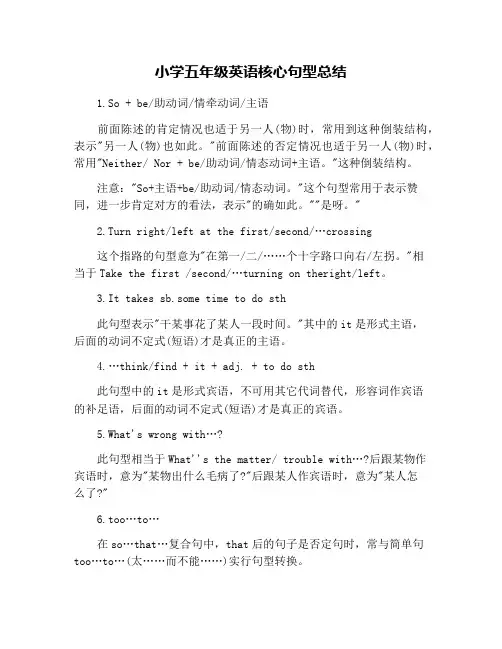
小学五年级英语核心句型总结1.So + be/助动词/情牵动词/主语前面陈述的肯定情况也适于另一人(物)时,常用到这种倒装结构,表示"另一人(物)也如此。
"前面陈述的否定情况也适于另一人(物)时,常用"Neither/ Nor + be/助动词/情态动词+主语。
"这种倒装结构。
注意:"So+主语+be/助动词/情态动词。
"这个句型常用于表示赞同,进一步肯定对方的看法,表示"的确如此。
""是呀。
"2.Turn right/left at the first/second/…crossing这个指路的句型意为"在第一/二/……个十字路口向右/左拐。
"相当于Take the first /second/…turning on theright/left。
3.It takes sb.some time to do sth此句型表示"干某事花了某人一段时间。
"其中的it是形式主语,后面的动词不定式(短语)才是真正的主语。
4.…think/find + it + adj. + to do sth此句型中的it是形式宾语,不可用其它代词替代,形容词作宾语的补足语,后面的动词不定式(短语)才是真正的宾语。
5.What's wrong with…?此句型相当于What''s the matter/ trouble with…?后跟某物作宾语时,意为"某物出什么毛病了?"后跟某人作宾语时,意为"某人怎么了?"6.too…to…在so…that…复合句中,that后的句子是否定句时,常与简单句too…to…(太……而不能……)实行句型转换。
在so…that…复合句中,that后的句子是肯定句时,常与简单句…enough to…实行句型转换。
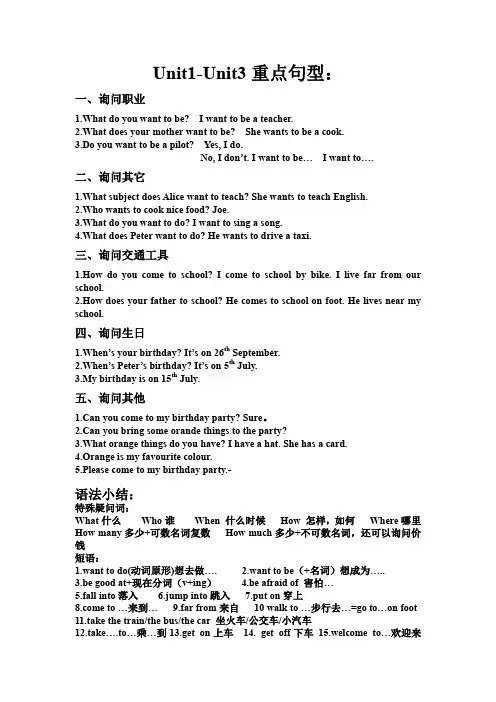
Unit1-Unit3重点句型:一、询问职业1.What do you want to be? I want to be a teacher.2.What does your mother want to be? She wants to be a cook.3.Do you want to be a pilot? Yes, I do.No, I don’t. I want to be…I want to….二、询问其它1.What subject does Alice want to teach? She wants to teach English.2.Who wants to cook nice food? Joe.3.What do you want to do? I want to sing a song.4.What does Peter want to do? He wants to drive a taxi.三、询问交通工具1.How do you come to school? I come to school by bike. I live far from our school.2.How does your father to school? He comes to school on foot. He lives near my school.四、询问生日1.When’s your birthday? It’s on 26th September.2.When’s Peter’s birthday? It’s on 5th July.3.My birthday is on 15th July.五、询问其他1.Can you come to my birthday party? Sure。
2.Can you bring some orande things to the party?3.What orange things do you have? I have a hat. She has a card.4.Orange is my favourite colour.5.Please come to my birthday party.-语法小结:特殊疑问词:What什么Who谁When 什么时候How 怎样,如何Where哪里How many多少+可数名词复数How much多少+不可数名词,还可以询问价钱短语:1.want to do(动词原形)想去做….2.want to be(+名词)想成为…..3.be good at+现在分词(v+ing)4.be afraid of 害怕…5.fall into落入6.jump into跳入7.put on穿上e to …来到…9.far from来自10 walk to …步行去…=go to…on foot11.take the train/the bus/the car 坐火车/公交车/小汽车12.take….to…乘…到13.get on上车14. get off下车15.welcome to…欢迎来到…16.have some fun玩的开心=have a good time 17.right away立刻,马上。
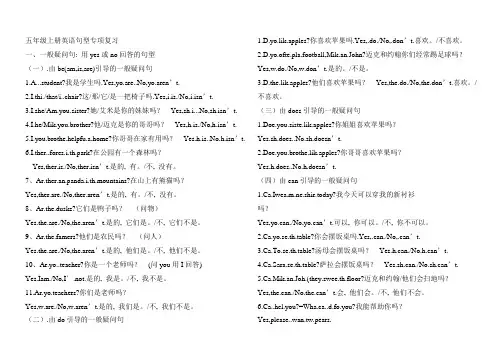
五年级上册英语句型专项复习一、一般疑问句: 用yes或no回答的句型(一).由be(am,is,are)引导的一般疑问句1.A...student?我是学生吗.Yes,yo.are..No,yo.aren’t.2.I.thi./that/i..chair?这/那/它/是一把椅子吗.Yes,i.is./No,i.isn’t.3.I.she/Am.you.sister?她/艾米是你的妹妹吗?Yes,sh.i...No,sh.isn’t.4.I.he/Mik.you.brother?他/迈克是你的哥哥吗?Yes,h.is./No,h.isn’t.5.I.you.brothe.helpfu.a.home?你哥哥在家有用吗?Yes.h.is..No.h.isn’t.6.I.ther..fores.i.th.park?在公园有一个森林吗?Yes,ther.is./No,ther.isn’t.是的, 有。
/不, 没有。
7、Ar.ther.an.panda.i.th.mountains?在山上有熊猫吗?Yes,ther.are./No,ther.aren’t.是的, 有。
/不, 没有。
8、Ar.the.dusks?它们是鸭子吗?(问物)Yes.the.are./No,the.aren’t.是的, 它们是。
/不, 它们不是。
9、Ar.the.famers?他们是农民吗?(问人)Yes.the.are./No,the.aren’t.是的, 他们是。
/不, 他们不是。
10、Ar.yo..teacher?你是一个老师吗?(问you用I回答)Yes.Iam./No,I’.not.是的, 我是。
/不, 我不是。
11.Ar.yo.teachers?你们是老师吗?Yes,w.are./No,w.aren’t.是的, 我们是。
/不, 我们不是。
(二).由do引导的一般疑问句1.D.yo.lik.apples?你喜欢苹果吗.Yes,.do./No,.don’t.喜欢。
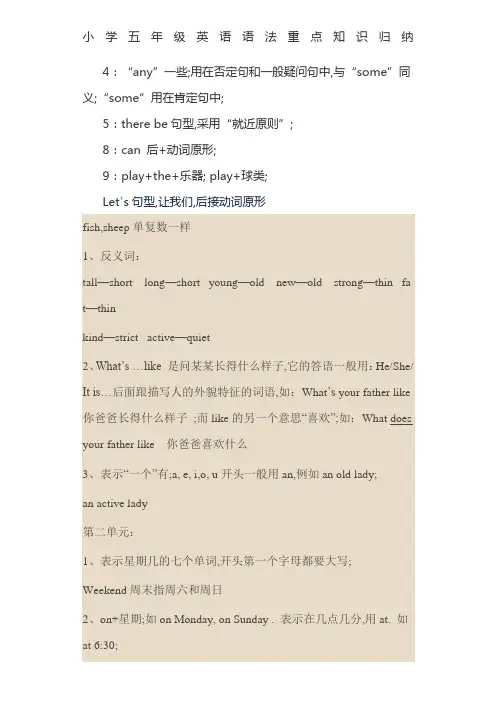
小学五年级英语语法重点知识归纳4:“any”一些;用在否定句和一般疑问句中,与“some”同义;“some”用在肯定句中;5:there be句型,采用“就近原则”;8:can 后+动词原形;9:play+the+乐器; play+球类;Let’s句型,让我们,后接动词原形fish,sheep单复数一样1、反义词:tall—short long—short young—old new—old strong—thin fa t—thinkind—strict active—quiet2、What’s …like 是问某某长得什么样子,它的答语一般用:He/She/ It is…后面跟描写人的外貌特征的词语,如:What’s your father like 你爸爸长得什么样子;而like的另一个意思“喜欢”;如:What does your father like 你爸爸喜欢什么3、表示“一个”有;a, e, i,o, u开头一般用an,例如an old lady;an active lady第二单元:1、表示星期几的七个单词,开头第一个字母都要大写;Weekend周末指周六和周日2、on+星期;如on Monday, on Sunday . 表示在几点几分,用at. 如at 6:30;3、with和…一起,with后面常用人称代词的宾格形式;如:I can play ping-pong with you.我可以和你一起打乒乓球I can playping-pong with him. I can play ping-pong with her .him他、her她; 4、I like Sundays.是指所有的星期日,所以用复数形式;I’d=I would2、some与any的区别:any用在否定句、疑问句;例如:There isn’t any……There aren’t any……或者Are there any…… some用在肯定句;3、 tomato 和potato 的复数形式在后面加es, tomatoes, potatoes; 第五六单元1.There be句型包括There is a …后面跟名词单数,表示一个;例如:There are some…后面跟名词复数,表示多个;There are many…后面跟名词复数,表示多个;2. on与over的区别on: 在;;;上面,表示与下面的物体相互接触,紧挨着;over: 在;;;上方,表示与下面的物体没有接触,悬空着;3.疑问词:what,where ,who,what time,who whose when how how many1 what 什么, What’s this 这是什么What’s your name 你的名字是什么What’s your father like 你爸爸长得什么样子What’s your mother 你妈妈是干什么的2where 哪里,如Where are you 你来自哪里 Where is your ruler 尺子在哪里呢3who 谁; 用来问人物是谁如Who’s that man 那个男人是谁4whose 谁的,如:Whose book is this 这是谁的书5 what time 什么时间,用来问具体的时间是几点6what colour 什么颜色,用来问物体是什么颜色的;7when 什么时候, 用来问时间,后面常跟动词; 如:When do you get up 8 how 怎么样如:How are you 你好吗9how many 多少;用来问物体的数量; 如:How many books do you have 你有多少本书10how much 多少钱;用来问商品或者物体的价格;如:How much is your schoolbag 7. 以Is, Are,Can, Do,Does 等开头的问句是一般疑问句;如: Is your sister a teacher Yes, she is. / No, she isn’t.Are you a student Yes, I am. / No, I’m not. Doyou have new teachers Yes, we do. / No, we don’t.Can you wash the clothes Yes, I can. / No, I can’t.on 与above的区别:on在…上面;表示与下面的物体互相接触,紧挨着;above 在…上方,表示与下面的物体不接触,两个物体之间有一定的距离;1.Beis, am, are 的用法口诀be动词am is are ;我I用am,你you用are; is连着他,她,它he, she, it; 我们,你们和他们we, you, they,全部都用are 2. be like与do like: What’s…like 是问”某某长什么样子”的意思;它的答语一般用He/She/ It is…后面跟描写人的外貌特征的词语;而在What does … like 的句子中,like是“喜欢”的意思;如:What does your father like 你的爸爸喜欢什么它的答语是He/She/ It likes…后面跟喜欢的东西;Unit 2 My week星期一到星期天,首字母要大写;Monday 星期一Tuesday星期二Wednesday星期三Thursday星期四1. 描述人的外貌单词old 年老的young年轻的tall 高的short 矮的strong 强壮的thin 瘦的 2.描述人的性格的单词funny滑稽的kind 和蔼的strict严格的polite 有礼貌的hard-working 工作努力的helpful 能干的clever 聪明的shy 害羞的3.其他单词sometimes有时will 将要know 知道robot机器人finish 完成he’s=he is 他是who’s=who is谁是Mr先生Miss 小姐Ms 女士speak English 说英语y i baby 婴儿happy 高兴windy 刮风的sunny 晴朗的sorry 抱歉句型Ms Wang will be our new Chinese teacher.王女士是我们新语文老师What’s she like 她怎么样She’s very kind.她很和蔼;Is she strict 她严格吗Yes, sometimes.是的,有时候. | Do you know Mr Young 你认识杨先生吗No,I don’t .不,不认识; Yes,I do是的,我认识;Who is your maths teacher 谁是你的数学老师Mr Li李先生;Is he funny 他搞笑吗Yes,he is.是的,他搞笑;No,he isn’t.不,不搞笑;1.Beis, am, are 的用法口诀be动词am is are ;我I用am,你you用are; is连着他,她,它he, she, it; 我们,你们和他们we, you, they,全部都用are2. be like与do like:What’s…like 是问”某某长什么样子”的意思;它的答语一般用:He/She/ It is…后面跟描写人的外貌特征的词语;而在What does … like 的句子中,like是“喜欢”的意思;如:What does your father like 你的爸爸喜欢什么它的答语是He/She/ It likes…后面跟喜欢的东西;Unit 2 My week星期一到星期天,首字母要大写;Monday 星期一Tuesday星期二Wednesday星期三Thursday星期四Friday星期五Saturday星期六Sunday星期日weekend 周末often通常cooking烹饪tired疲惫的should 应该schedule 日程安排短语wash my clothes洗衣服watch TV看电视do homework做家庭作业read books读书play football踢足球play sports做体育运动every day每一天do housework做家务语音ee i: feet 脚beef 牛肉meet 见面ea i: tea 茶read 阅读eat 吃句型What do you have on Thursdays 星期四你有什么课I have maths, English and music.我有数学课,英语课和音乐课; What do you do on Wednesdays 你星期三都在做什么I often do my homework . 我通常在写我的家庭作业;What do you often do on the weekend 你周末常干什么I often watch TV.我常看电视.Sometimes I read books. 有时候我看书;Do you often read books in this park 你常常在这个公园读书吗No, I don’t.不,我不经常在这看书; Yes, I do. 是的;我经常;What do we have on Wednesdays 星期三我们都有什么课We have English、science and computer on Wednesdays.我们星期三有英语、科学和计算机;What day is it today 今天是星期几It’s Monday.今天是星期一;You look tired. 你看起来很累;You should play sportseveryday. 你应该每天做运动;1. 合成词:两个简单的单词放在一起,变成一个新的单词,如:bedroom,classroom 2. in, on ,at 后面跟表示时间的词语时,1在上午,下午,晚上用in.如in the morning, in the afternoon, in the evening.2表示在某日,在星期几时,用on;如on Monday, on Sunday .3表示在几点几分,在几点时,用at. 如at 6:30, at 9 o’clock.What do you have on Mondays 周一你们都有什么课We have Chinese, English, math and science on Mondays. What do you do on Mondays 周一你都做什么I often do homework, read books and watch TV.Unit 3 What would you like 1.食品类hungry 饿的时候吃eatsandwich三明治salad沙拉hamburger汉堡包ice cream冰淇淋2.饮料类thirsty 渴的时候喝drinktea茶milk牛奶juice果汁 water 水3.形容味道类单词fresh新鲜的healthy 健康的delicious美味的hot辣的sweet 甜的4.其他类drink喝thirsty渴的favourite最喜欢的food食物onion洋葱语音ow au cow 奶牛flower 花WOW 哇down 向下ow əʊ slow 慢的snow 雪yellow 黄色window 窗户句型What’s your favorite food 你最喜欢的食物是什么My favourite food is fish.我最喜欢的食物是鱼;What would you like to eat 你想吃什么I’d like some noodles我想吃面条;What would you like to drink 你想喝什么I’d like some water. I’m thirsty我要一些水,我渴了;My favorite foot is ice cream .It is sweet. 我最喜欢的食物是冰淇淋,它很甜;I don’t like beef but chicken is OK我不喜欢牛肉但是鸡肉可以;I like vegetables but not carrots我喜欢蔬菜,但是不喜欢胡萝卜; 语法点1.吃饭时,询问他人想吃和想喝什么时,----What would you like to eat/drink 你想要吃/喝什么----I’d like a sandwich/hamburger/ an egg, please我想要一个三明治/汉堡/蛋.tea/milk/juice/water, please. 我想要点茶/牛奶/果汁/水;注意:可数的食物也可以在前面加上数字,表示几个,如:I’d like two hamburgers/three sandwiches/five hot dogs, please.我想要两个汉堡/三个三明治/五个热狗.2.当你想知道你朋友或父母最爱吃的食物或最爱喝的东西是什么时,---What’s your favourite food/dr ink---Ice cream. It’s sweet./ Juice. It’s healthy.3.单词的复数形式1一般情况下,在单词后面直接加s;2以o, s, x, ch, sh结尾的单词,加es;3people, fish,sheep单数形式和复数形式一样,不加s.Unit 4 What can you do 签字:单词dance跳舞cook烹饪swim游泳we’ll=we will party聚会next 下一个wonderful极好的learn学习any若干no problem没问题want想要send邮寄Email电子邮件短语sing English songs唱英文歌曲play the pipa弹琵琶do kung fu 练武术draw cartoons画漫画play basketball打篮球play ping-pong打乒乓球speak English说英语语音oo u book 书look 看football 足球good 好oo u: balloon 气球food 食物zoo 动物园noodles 面条句型当举办宴会时,调查同学们会什么时,可以这样问:---What can you do for the party 你能为聚会做什么---I can dance/do kung fu/ play the pipa. 我会跳舞/打武术/弹琵琶;----Wonderful极好的;---Can you swim/cook/play ping-pong 你会游泳/烹饪/打乒乓球吗----Yes.,I can. 是的,我会;/ No, I can’t.不,我不会;---I can’t do any kung fu . 我不会武术;---No problem. I can help you. 没问题,我会帮你的;Please send me an email at . 请给我发送电子邮语法点1.乐器名词前要加the,但是球类名词前不加the;play the pipa play the erhu play the piano play the violin play football play basketball play volleyball play ping-pong 2.can的用法陈述句肯定式:主语+can + 动词;m如:I can cook. 我会做饭;陈述句否定式:主语+can +not + 动词;如:I can not / can’t cook. 我不会做饭;句式一般疑问式及回答:Can + 主语+ 动词如:---- Can you cook 你会做饭吗----- Yes, I can./ No, I can’t.会,我会;/不,我不会;特殊疑问式:What + can +主语+do如:What can you do 你会做什么3. some和any 的区别.some用于肯定陈述句中. I can do some kung fu.any 用于否定句和疑问句中. I can’t do any kung fu.Unit 5 There is a big bed. 签字:单词和短语clock时钟plant植物water bottle水瓶bike自行车photo相片in front of在…前面between在…之前above在…上面beside 在旁边behind在…后面there表示存在或发生grandparents 祖父母lots of大量flower 花move 搬家dirty肮脏的live居住everywhere处处ai ei rainy 下雨的rainbow 彩虹paint 涂wait 等待ay ei say 说way 路birthday 生日Monday 星期一句型What’s in your room 你的房间里有什么There is a nice photo in my room.我的房间有一张好看的照片; My computer is on the desk. 我的电脑在桌子上;There are so many pictures and plants here .这里有这么多画和植物;My grandparents have a garden in front of their house.我的祖父母的房子前面有一个花园;I just moved into an old house. 我刚搬进了一个老房子里;I see a mouse behind my computer. 我看见了一只老鼠在我的电脑后面;I live near the nature park. 我住在自然公园旁边;语法点1.there be句型又叫“存在句型”,表示在某地有某物,包括:1单数形式there is a/an +名词单数+地点,表示在某地有一个….如:There is a clock/bike/photo/plant/water bottle beside/on/behind/….…旁边/上面/后面有一个钟/自行车/相片/水瓶There is an apple/egg beside/on/behind/….…旁边/上面/后面有一个苹果/鸡蛋2复数形式两个及以上的There are +具体数字two/three/many/some+名词复数+地点,表示有多个如:There are two bikes in front of the house. 房子前有两辆自行车;There are some buildings in the park. 公园里有一些建筑; There are many trees in the forest. 森林里有许多树;2.there be 句型中使用单数句式还是复数句式遵循”就近原则”;3. have/ has 用于表达某人拥有某物.I have three pens and she has one pen.4Unit 6 In a nature parkUnit 6 In a nature park 签字:单词forest森林river河流lake湖泊mountain高山hill山丘tree 树bridge桥building 建筑物village乡村house房子go boating 划船rabbit兔子high高的aren’t = are not isn’t = is not nature park 自然公园语音ou au house 房子mouse 老鼠sound 声音count 数句型Is there a river in the forest 森林里有条河流吗Yes, there is.是的,有; No, there isn’t.不,没有;Are there any tall buildings in your village 你的村庄里有高楼吗Yes, there are 是的,有些; No, there aren’t.不,没有;The nature park is so quiet. 这自然公园好安静;There aren’t many people . 这里没有很多人;注意:any用在疑问、否定句中,some用在肯定句中;语法点1.当询问“这里有什么吗”时,只需要把There is… 变成Is there… There are…变成Are there... 如:1There is a river/hill/forest/lake/mountain.这里有一条河/一座小山/一片森林/一座高山;Is there a river/hill/forest/lake/mountain这里有一条河/一座小山/一片森林/一座高山吗肯定回答:Yes, there is. 否定回答:No,there isn’t.2 There are four bridges/villages. 这里有四架桥/四个村庄Are there four bridges/villages 这里有四架桥/四个村庄吗肯定回答:Yes, there are. 否定回答:No,there aren’t.2. some和any 的区别.some用于肯定陈述句中. There are some houses in thevillage. any 用于否定句和疑问句中. Are there any houses in the village No, there aren’t any houses in the village.。
五年级1-9单元英语重点句型一、I’d like a cold drink. 我想要一杯冷饮。
Can I help you? 我能帮助你吗?I’d like +东西. 我想要……二、Do you want some rice? 你想要一些米饭吗?Do you want some +东西?你想要一些……吗?Yes,please. 好的。
Here you are! 给你。
Thank you very much. 谢谢。
三、Can I borrow a pencil? 我能借一支铅笔吗?Excuse me. Can I borrow a +东西?打扰一下,我能借一个……吗?Yes,here you are. 好的,给你。
Thank you. 谢谢。
You are welcome. 不用谢。
四、Can I have a puppy? 我能有一只小狗吗?Can I have a +小动物?我能有一个……吗?Yes,you can. 是的,你能。
No,you can’t. 不,你不能。
But you an have a rabbit. 但是你能有一只小兔子。
五、Which one do you want? 你想要哪一个?Which one do you want,a long one or a short one? 你想要哪一个,长的还是短的?A short one,please. 短的。
Which one do you want,the think one or the thin one? 你想要哪一个,厚的还是薄的?The think one,please. 厚的。
Which one do you want,the yellow one or the red one? 你想要哪一个,黄的还是红的?The red one,please. 红的。
六、I like sweets. 我喜欢糖果。
I have a box of sweets. 我有一盒糖果。
五年级英语上册重点句子和单词五年级英语上册主要学习英语基础知识,如单词、句子、语法等。
下面将详细介绍五年级英语上册的重点句子和单词。
一、重点句子:1. What's your name? - My name is Alice.这是一个非常基础的问候句型,在日常交流中常用。
意思是“你叫什么名字?- 我叫艾丽斯”。
2. How old are you? - I'm ten years old.这个句子用于询问对方的年龄,回答时需使用具体数字。
“你几岁了?- 我十岁了”。
3. Where are you from? - I'm from China.这个句子用于询问对方的国籍或来自哪里。
“你来自哪个国家?- 我来自中国”。
4. Can you speak English?这个句子用于询问对方是否会说英语。
“你会说英语吗?”。
5. What's your favorite color/food/animal?这个句子用于询问对方的喜好。
“你最喜欢的颜色/食物/动物是什么?”。
6. Do you have any brothers or sisters?这个句子用于询问对方是否有兄弟姐妹。
“你有兄弟姐妹吗?”。
7. How do you go to school?这个句子用于询问对方上学的方式。
“你是怎么去学校的?”。
8. What's the weather like today?这个句子用于询问当天天气状况。
“今天天气怎么样?”。
9. Can you help me, please?这个句子用于请求对方帮助。
“你能帮我一下吗?”。
10. What's the time?这个句子用于询问时间。
“几点了?”。
11. Are you a student?这个句子用于询问对方是否为学生。
“你是学生吗?”。
12. What do you want to be when you grow up?这个句子用于询问对方的职业理想。
五年级英语重点句型五年级英语第一单元:1、This is my father, my mother and me. 这是我的爸爸、妈妈和我。
2、I have two grandmothers and two grandfathers.3、I don’t have brothers and sisters. 我没有兄弟姐妹。
4、I have a friend named Jenny Smith. 我有一个朋友叫詹尼·史密斯。
5、We live in China. 我们居住在中国。
She lives in Canada. 她居住在加拿大。
6、This is a picture of her family. 这是一张她的家庭的照片。
7、He is older (younger)than Jenny. 她比詹尼大。
8、My father has a brother. 我的爸爸又一个兄弟。
9、What do they look like? 他们长的怎么样?10、Look at my hair! 看我的头发。
11、How many people in my family wear glasses? 在你的家里有多少人戴眼镜。
12、How do they do go to work? 他们是怎样去上班的?They walk to work. ( They go to work on foot ) Array 13、He drives to work. 他开车去上班。
She goes to work on her bicycle.He walks to work.14、How does she go to work? 她是怎么去上班的。
By bus. 坐公交车去。
15、What do they do? 他们是干什么的?They are teachers.16、She goes to work on her bicycle.He walks to work.17、Is she a bus driver ? 她是一位公共汽车司机吗?( a nurse护士/ a waitress女服务员/ a police officer 警察/ a cashier收银员/ acarpenter)18、What do they like to do? 他们喜欢干什么?They like to play. 他们喜欢玩。
五年级英语下册单词和重点句型一、单词1.animal(动物)- a living creature such as a dog or cat that is not a human being例句:I love animals, especially dogs.2.cloud(云)- a white or grey mass in the sky, made up of very small floating drops of water例句:Look at the clouds in the sky, they are so beautiful.3.continue(继续)- to keep happening, existing, or doing something without stopping例句:The rain continued for several hours.4.exercise(锻炼)- physical activity that you do to make your body strong and healthy例句:I do exercises every morning to keep fit.5.fruit(水果)- something sweet that grows on a tree or bush and contains seeds or a stone covered by skin例句:I like to eat apples, oranges, and other fruits.6.island(岛屿)- a piece of land that is completely surrounded by water例句:We went to a beautiful island for our vacation.7.nature(自然)- everything in the physical world that is not controlled by humans, such as plants, animals, and natural events例句:I love spending time in nature, it helps me relax.8.picnic(野餐)- a meal that you have outside, often with friends, where you take food and drink with you例句:Let's have a picnic in the park this weekend.9.popular(受欢迎的)- liked by many people; frequently chosen or used例句:Harry Potter books are very popular among children.10.subject(科目)- an area of knowledge, especially one that you study at school, college, or university例句:My favorite subjects at school are English and Science.11.vegetable(蔬菜) - a plant or part of a plant that is eaten as food.例句:Eating vegetables is good for your health.12.mountain(山) - a large natural elevation of the earth's surface rising abruptly from the surrounding level; a large hill.例句:The mountains are covered with snow in winter.13.river(河) - a large natural stream of water flowing in a channel to the sea, a lake, or another river.例句:The river flows through the city.14.ocean(海洋) - a very large area of sea.例句:The ocean is full of mysteries.15.star(星星) - a celestial body that shines by its own light or byreflected light.例句:We can see many stars in the sky at night.16.moon(月亮) - the natural satellite of the earth.例句:The moon is full tonight.17.sun(太阳) - the star around which the earth and other planets revolve.例句:The sun is shining brightly.18.flower(花) - the reproductive structure of angiosperms, typically having brightly colored petals and a sweet fragrance.例句:The garden is full of beautiful flowers.19.book(书) - a written or printed work consisting of pages glued or sewn together along one side and bound in covers.例句:I love reading books.20.pen(钢笔) - an instrument for writing or drawing with ink.例句:I use a pen to write my diary.21.pencil(铅笔) - an instrument for writing or drawing made of a slender rod of graphite or a similar substance enclosed in a wooden casing.例句:I use a pencil to sketch.22.ruler(尺子) - an instrument for measuring or drawing straight lines.例句:I need a ruler to draw a straight line.23.eraser(橡皮) - an object used to remove pencil or ink marks from paper.例句:I can't find my eraser.24.backpack(背包) - a bag with shoulder straps, used to carry books andother items.例句:I carry my books in a backpack.25.desk(书桌) - a table, typically with drawers, at which one can read, write, or do other work.例句:My desk is messy.26.chair(椅子) - a seat with a back and legs, for one person.例句:I sit on a chair to study.27.classroom(教室) - a room in a school or college where classes are held.例句:The classroom is clean and tidy.28.teacher(老师) - a person who teaches, especially in a school.例句:My teacher is very kind.29.student(学生) - a person who is studying at a school or college.例句:I am a student.30.homework(家庭作业) - work that is assigned to students to be done outside of class.例句:I have a lot of homework to do.31.test(考试) - an examination of knowledge or skills, typically by means of questions and answers or practical exercises.例句:I am nervous about the test.32.grade(成绩) - a mark or score given for a piece of work or an examination. 例句:I got a good grade on my test.33.library(图书馆) - a building or room containing collections of books, periodicals, and sometimes films and recorded music for use or borrowing bythe public or a particular group.例句:I like to study in the library.34.bookstore(书店) - a shop that sells books.例句:I went to the bookstore to buy a new book.35.movie(电影) - a series of moving images, usually with sound, that tell a story.例句:I watched a movie last night.36.theater(剧院) - a building or outdoor area where plays and other dramatic performances are given.例句:We went to the theater to see a play.37.music(音乐) - an art form consisting of sound and silence, organized in time.例句:I love listening to music.38.instrument(乐器) - an object used to produce musical sounds.例句:He plays many instruments.39.singer(歌手) - a person who sings, especially professionally.例句:The singer has a beautiful voice.40.dance(舞蹈) - an art form consisting of movements of the body, usually in time to music.例句:She loves to dance.41.sport(运动) - an activity involving physical exertion and skill in which an individual or team competes against another or others.例句:I like to play sports.42.football(足球) - a game played by two teams of eleven players each, usinga round ball which players kick up and down the field in an attempt to score goals.例句:I play football with my friends.43.basketball(篮球) - a game played by two teams of five players each, usinga round ball which players try to throw through a hoop mounted on a backboard at each end of the court.例句:He is good at basketball.44.tennis(网球) - a game played by two or four players on a rectangular court, using a racket and a small, hollow rubber ball.例句:I play tennis on weekends.45.swimming(游泳) - the act of moving through water by using the arms and legs.例句:I go swimming every day.46.running(跑步) - the act of moving quickly on foot by alternately taking one foot off the ground and putting it down in front of the other.例句:I like running in the morning.47.cycling(骑自行车) - the act of riding a bicycle.例句:He goes cycling every weekend.48.hiking(徒步旅行) - the activity of going for long walks in the countryside.例句:We went hiking in the mountains.49.camping(露营) - the activity of spending a night or more outdoors in atent or other shelter.例句:I love camping in the summer.50.park(公园) - a public area of land set aside for recreation and enjoyment, usually with trees, grass, and flowers.例句:We went to the park to have a picnic.51.garden(花园) - a piece of land, usually near a house, used for growing flowers, vegetables, or other plants.例句:My grandmother has a beautiful garden.52.tree(树) - a large plant with a trunk, branches, and leaves.例句:There are many trees in the park.53.leaf(树叶) - a flattened structure growing from a stem or branch of a plant.例句:The leaves are turning red in autumn.54.flowerpot(花盆) - a container in which plants are grown.例句:I planted a flower in a flowerpot.55.bird(鸟) - a warm-blooded vertebrate animal that has feathers, wings, anda beak.例句:I saw a beautiful bird in the garden.56.fish(鱼) - a cold-blooded vertebrate animal that lives in water and has gills, fins, and a tail.例句:There are many fish in the river.57.insect(昆虫) - a small animal with six legs and a body divided into three parts.例句:I saw an interesting insect in the garden.58.butterfly(蝴蝶) - a flying insect with large, brightly colored wings.例句:The butterfly is very beautiful.59.bee(蜜蜂) - a flying insect that makes honey and pollinates flowers.例句:Bees are very busy.60.ant(蚂蚁) - a small insect that lives in colonies and is known for its hard work and organization.例句:Ants are very strong.61.house(房子) - a building for human habitation, usually consisting of a roof, walls, and floors.例句:I live in a big house.62.room(房间) - a part of a building enclosed by walls and a ceiling.例句:My room is very clean.63.kitchen(厨房) - a room or area where food is prepared and cooked.例句:My mother is cooking in the kitchen.64.bedroom(卧室) - a room where one sleeps.例句:I am sleeping in my bedroom.65.bathroom(浴室) - a room containing a bath or shower and often a toilet. 例句:I am taking a shower in the bathroom.66.living room(客厅) - a room in a house used for relaxing and entertaining guests.例句:We are watching TV in the living room.67.furniture(家具) - the movable articles that are used to make a room or building suitable for living or working.例句:We bought some new furniture for our house.68.table(桌子) - a piece of furniture with a flat top and one or more legs, used for eating, working, or playing games.例句:There is a vase on the table.69.chair(椅子) - a seat with a back and legs, for one person.例句:I am sitting on a chair.70.sofa(沙发) - a long, upholstered seat with a back and arms, for two or more people.例句:We are sitting on the sofa.71.bed(床) - a piece of furniture for sleeping or resting on.例句:I am lying on my bed.72.cupboard(橱柜) - a piece of furniture with shelves and doors, used for storing dishes, food, or other items.例句:There are many cups in the cupboard.73.drawer(抽屉) - a box-like compartment that slides in and out of a piece of furniture.例句:I keep my socks in a drawer.74.window(窗户) - an opening in a wall or roof to let in light and air.例句:The window is open.75.door(门) - a movable barrier used to close an opening in a wall or fence. 例句:I opened the door.76.floor(地板) - the surface of a room on which one stands or walks.例句:The floor is clean.77.ceiling(天花板) - the upper surface of a room, usually covered with plaster or other material.例句:The ceiling is high.78.wall(墙) - a vertical structure that divides or encloses an area.例句:The wall is painted white.79.color(颜色) - the visual perception of different wavelengths of light.例句:I like blue color.80.red(红色) - a bright color that is associated with heat, energy, and passion.例句:The rose is red.81.blue(蓝色) - a color that is associated with calmness, stability, and trust.例句:The sky is blue.82.green(绿色) - a color that is associated with nature, growth, and freshness.例句:The grass is green.83.yellow(黄色) - a bright color that is associated with sunshine, happiness, and optimism.例句:The sunflower is yellow.84.purple(紫色) - a color that is associated with royalty, luxury, and creativity.例句:The flower is purple.85.orange(橙色) - a bright color that is associated with energy, warmth, and enthusiasm.例句:The sunset is orange.86.white(白色) - a color that is associated with purity, innocence, and simplicity.例句:The snow is white.87.black(黑色) - a color that is associated with mystery, elegance, and power.例句:The cat is black.88.grey(灰色) - a color that is a mixture of black and white, and is associated with neutrality, balance, and stability.例句:The clouds are grey.89.brown(棕色) - a color that is associated with earth, stability, and reliability.例句:The bear is brown.90.pink(粉色) - a light red color that is associated with femininity, sweetness, and romance.例句:The dress is pink.91.clothes(衣服) - items of clothing.例句:I need to buy some new clothes.92.shirt(衬衫) - a garment for the upper body, typically with a collar, sleeves, and buttons down the front.例句:He is wearing a white shirt.93.pants(裤子) - an outer garment covering the body from the waist to the ankles.例句:I am wearing blue pants.94.skirt(裙子) - a garment for women or girls, hanging from the waist and usually reaching to the knees or ankles.例句:She is wearing a beautiful skirt.95.dress(连衣裙) - a one-piece garment for women or girls, typically with a skirt and bodice.例句:I bought a new dress.96.shoe(鞋子) - an outer covering for the foot, typically made of leather or other material.例句:I need to buy new shoes.97.sock(袜子) - a garment for the foot and lower leg, typically made of cotton or wool.例句:I am wearing white socks.98.hat(帽子) - a head covering.例句:He is wearing a black hat.99.gloves(手套) - a covering for the hand, typically with separate parts for each finger.例句:I am wearing gloves to keep my hands warm.100.coat(外套) - an outer garment, typically with sleeves and a fastening down the front.例句:I am wearing a warm coat.二、重点句型1. What's your favorite...?(你最喜欢的是什么…?)例句:What's your favorite color? - My favorite color is blue.这个句型用来询问对方最喜欢的事物,比如颜色、动物、食物等等。
Unit 1 My New Teacher1、Who’s your English teacher? Mr. Carter.谁是你的英语教师?卡特先生。
2、What’s he like? He’s tall and strong他长得怎么样?他又高又壮。
3、Is she quiet? No,she isn’’s very active.她文静吗?不,她不是。
她超级活跃。
4、Is she strict? Yes,she is,but she’s very kind.她严格吗?是的,她是。
但她很和善。
Unit 2 My Days of the Weeks一、What day is it today? It’s Wednesday.今天礼拜几?今天礼拜三。
二、What do you have on Thursdays?在礼拜四你们上什么课?We have English ,math and science on Thursdays.咱们在礼拜四上英语、数学和科学。
3、What do you do on Saturdays? I watch TV on Saturdays.你在礼拜六做什么?我在礼拜六看电视。
4、What about you? I do my homework,too.你呢?我也在做作业。
Unit 3 What’s Your Favourite Food?一、What do you have for lunch on Mondays? We have tomatoes,tofu and fish.在礼拜一你们午饭吃什么?咱们吃西红柿、豆腐和鱼。
二、What would you like for lunch? I’d like tomatoes and mutton.午饭你想吃什么?我想吃一些西红柿和羊肉。
3、What’s your favourite food? I like ’re sweet.你最喜爱的水果是什么?我喜爱苹果,它们是甜的。
小学英语五年级(PEP)(上)四会、三会、二会单词及重点句型四会(听、说、读、写)单词Young年轻的, funny滑稽的、可笑的, tall高的, strong强壮的, kind和蔼的、亲切的,(种类) old 年老的, short矮的, thin瘦肉, who’s=who is谁是, Mr. 先生,what’s=what is是什么, like像、喜欢, he’s=he is他是, strict严格的, smart聪明的、巧妙的, active积极的、活跃的, quiet安静的、文静的, she’s=she is她是, very很、非常, but 但是, Monday(Mon.)星期一, Tuesday(Tue.)星期二, Wednesday(Wed.)星期三, Thursday(Thu.)星期四, Friday(Fri.)星期五, Saturday(Sat.)星期六, Sunday(Sun.)星期日,day天、日子, have有、吃, on 在…时候、在…上面, do homework做作业, watch TV 看电视, read books看书, What about…?怎么样, too 也、太, eggplant茄子, fish鱼, green beans青豆, tofu豆腐, potato西红柿, tomato马铃薯, for为、给, lunch午饭, we我们, tasty好吃的、可口的, sweet甜的, sour酸的, fresh新鲜的, salty咸的, favourite最喜爱的、特别喜爱的, they’re=they are他(她、它)们是, fruit水果, don’t=do not, grape葡萄, cook the meals做饭, water the flowers 浇花, sweep the floor扫地, clean the bedroom打扫卧室, make the bed铺床, set the table摆饭桌, wash the clothes洗衣服, do the dishes洗碗筷, can’t=can not不能, use a computer使用计算机, curtain窗帘, trash bin垃圾箱, closet壁橱、衣橱, mirror镜子, end table床头柜, bedroom 卧室, kitchen厨房, bathroom卫生间, living room 起居室, in在…里面, on在…上面, under在…下面, near在…旁边, behind在…后面, clothes衣服, river河流, flower花, grass草, lake湖泊, forest森林, path路、小道, park公园, picture 照片, house房屋, bridge桥, tree树, road公路、大道, building建筑物, clean干净的三会(听、说、认读)单词From从;来自, Canada加拿大, principal校长, university student大学生, Miss小组, wait等等,等待, yeah是,行, play computer games玩电脑游戏, cabbage洋白菜, pork猪肉, mutton羊肉, I’d like=I would like我想要, healthy健康的, now现在, have to不得不, eat吃, empty the trash倒垃圾, do housework做家务, put away the clothes 收拾衣服, air-conditioner空调, very much非常, over在…上面, in front of在…前面, sky天空, cloud云, mountain山,山脉, farm农场, village乡村,村庄, city城市二会(听、说)单词Know知道, lady女士,小姐,夫人, so much很,非常, fun有趣,逗笑, Moral Education思想品德课, Social Studies社会课, tomorrow明天, often常常,经常, love爱,热爱, do housework做家务, menu菜单, sound听起来, Mew Mew猫咪,咪咪, helpful有帮助的,有用的, at home在家里, ill有病的, wash the windows擦窗户, just do it就这么干吧, I’d like to=I would like to我想要, have a try试一试, robot机器人, play chess下棋, look at看一看, own自己的, flat公寓, third第三, work工作, tell告诉, nature park自然公园, holiday假期, air空气, run跑,any任何的,所有的重点句型:1. A: Who’s your art teacher/…?/Who is/are…? B: Mr. Hu./…你的美术老师是谁?胡老师2. A: What’s he/she like? B: He’s short and thin/…他/她长得怎么样?他/她又矮女瘦3. A: Is she/he young/…? B: Yes, she/he is. / No, she/he isn’t. / No, she/he’s old/…她/他年轻吗?是的不,她/他很老4. A: What day is it today/tomorrow? B: It’s Monday/…今天/明天是星期几?星期一5. A: What class do we/… have on Mondays/…?B:Letmesee.WehaveChineseandmath.星期一我们上什么课?让我想想,我们上语文和数学6. A: What do you do on Saturdays/…? B: I often do my homework/…星期六你干什么?我通常做作业7. That’s great! 太好了!8. I do my homework, too. 我也做作业9. A: What would you like for lunch? B: I’dlike some tomatoes and mutton/…午饭你想吃什么?我想要一些西红柿和羊肉10. A: What do you have for lunch today? 你今天午饭吃什么B: I have eggplant and tomatoes. What about you?我吃茄子和西红柿,你呢?11. That sounds good. 听起来太棒了12. A: What’s your favourite food? B: I like apples Because they’re sweet你最喜欢的食物是什么?我喜欢草果,因为它们很甜13. A: What can you do? B: I can sweep the floor/…你能干什么我能扫地14. A: Can you do housework? 你会做家务吗?B: Yes, I can./ No, I can’t.(,but I’d like to have a try.)我会,我不会,但我愿意试一试15. A: Is this your bedroom/…? B: Yes, it is./ No, it isn’t.这是你的卧室吧吗?是的不是16. Come and look at my new curtains. 来看看我的新窗帘17. A: What’s your room like? 你的房间是什么样的?B: There is a big closet, a new air-conditioner and a new mirror. There are blue curtains. 有一个大柜子,一台新空调和一面新镜子,还是蓝色的窗帘。